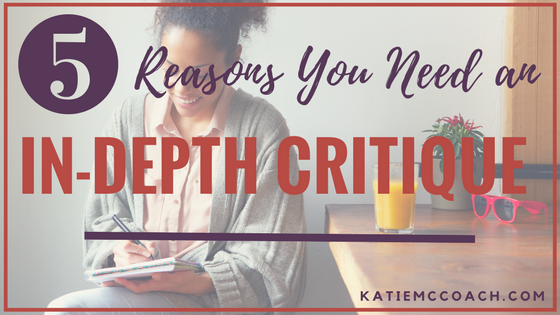
5 Reasons You Need an In-Depth Critique
Criticism is something many of us shy away from. Who wants to hear what they are doing wrong? Praise is where it’s at! Right?
Maybe not.
Criticism, in the most constructive way, makes us stronger—makes our writing, our voice, and our stories stronger.
Before I give you five of the many reasons you should get an in-depth critique—an abundance of constructive criticism—on your manuscript, I want to explain what an in-depth critique even is.
An in-depth critique is an honest and thorough examination of the manuscript. It’s a report that examines the characters, plot, structure, pace, genre, target audience, and writing mechanics. It addresses the strengths of the manuscript, as well as the areas that could use improvement and suggestions for taking it to the next level.
So why should you even get a critique? If all it will do is point out your flaws, who would want that??? Well, maybe you’ve found yourself in one of these five situations:
#1 – You want to grow as a writer
I’ve had many authors tell me that receiving a critique taught them more about their writing than they had ever learned in class or after years of writing. And not because those classes weren’t useful, but they found that having the clear insight into their manuscript, not someone else’s or not just lines here and there, made the teachings relatable. It’s the hands-on experience. Knowing something in theory doesn’t mean it always appears in your writing. A critique will not only help you for the manuscript you are writing now, but it will help you with your entire career as a writer.
#2 – Someone told you to get one
This happens sometimes when an author has pitched an agent, and the agent’s recommendation is to work with a critique partner or editor. Or you enter a contest and the judges’ feedback points out things you weren’t aware of. Or your writing group recommends it because they only get a chance to critique pieces of your work (and not the entire book at once). Or even a hired editor recommends it.
Not everyone in the industry can provide feedback, or even if they can, maybe they don’t have the time to. If someone recommends you get a critique, don’t take it as a blow to your work. Keep in mind that these people want to see you succeed, and they may realize they don’t have the time or background to provide a critique that would be valuable to your career.
#3 – The only people who have read your book are your friends or family
New writers I work with often quote friends and family as being big fans of their book. The thing is, these people are big fans of you and they want to protect your feelings. Honest feedback is difficult to give and difficult to receive. Most people are not versed in how to deliver a critique that is encouraging instead of disparaging.
Content editors have studied the art of the critique—they write clear and concise reports, they work in the industry so they know what to look for that your average reader may not, and they speak with authors just like you every single day. If anyone is going to deliver constructive criticism on your work, wouldn’t you want it from someone who does it day by day? Every editor has a different style in critiquing, but the end goal is always the same: help create a stronger book.
#4 – It’s good for your ego
Nothing will help you prepare for all the feedback, criticism, rejection, and even praise that will come from agents, editors, and readers, more than voluntarily and readily receiving an in-depth evaluation of your work. A critique will alert you to things you hadn’t considered. It will prep you for the way a reader may perceive a character, situation, or line of a dialogue. Constructive criticism may be difficult to receive, but knowing where you stand with your work will help you when the rejections get tough and keep you humble when praise is mighty. Take it all with a grain of salt. Nothing teaches that to you better than getting 10 pages of in-depth notes at once.
#5 – It’ll give you a step up on the competition
I’m a firm believer in folks supporting each other in their industries. I constantly recommend other editors, and I believe writers should support other writers. However, obtaining all the information at your disposal, making steps toward creating a stronger manuscript, will give you a leg up over those who don’t. If an agent receives one manuscript with POV issues, and another one without those issues, but both stories are equally engaging, the agent is more likely to take the issue-free manuscript into consideration.
In an in-depth critique, the editor will discuss writing or story issues that agents and publishing houses would notice. The critique allows you the chance to fix these things before the agent can judge it.
In short, those aren’t the only reasons to get a critique. But they are common reasons writers find their way to developmental editors. Getting an in-depth critique from an editor should not be something to fear, nor dismiss. Writing amazing stories for readers to enjoy, is much of why you do this, correct? Allow yourself the opportunity to become the strongest author you can be. Remember, constructive criticism pushes us to reach our best potential.
Find me on Twitter and let me know what you thought of this article: @katiemccoach
When you sign up for the KM Editorial monthly newsletter you’ll receive a free downloadable Guide to Getting Published.


 Download your free copy of these 8 tried-and-true strategies to stop self-doubt and imposter syndrome as a writer. And, build the power to resist it in the future.
Download your free copy of these 8 tried-and-true strategies to stop self-doubt and imposter syndrome as a writer. And, build the power to resist it in the future.
Great points, Katie. How many times has any writer wondered what they could have done to make their story better? All the reading of how-to books, all the study of the acclaimed books, helps some, but only a trained eye can make you, or me, as the author aware of the vast difficulties in creating great writing. Plot and characters, continuous hooks, the exact right word in the right place, the suspense of internal or external conflict. All these and more draw the reader into the story, and keep them turning pages. That’s what we want. In a world where re-writing is not only possible, but no longer a legitimate criticism, we all have the opportunity to improve even work that has been published. Good luck, writers. The effort makes the journey rewarding.
Thanks for stopping by, Michael! I love all the points you’ve made. I agree, that growth of our writing abilities does make the journey rewarding. How amazing to look back at the progress we’ve made on our writing craft?
Keep up the great writing!
I’d like to add don’t overboard have a bunch of critics come in at once (like online) or you’re just asking for a burn out trying to do it all! Not that I did anything like that. *Cough* I recommend Wattpad, Ccircle, Facebook (You can find beta readers in the book clubs. =O I forget the rest.